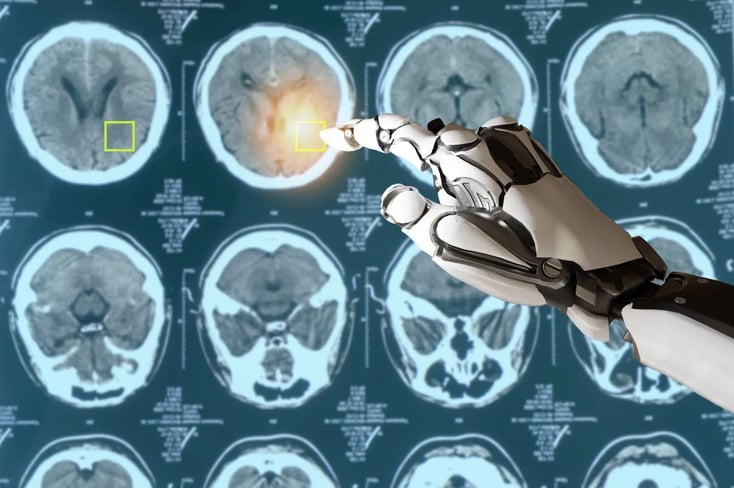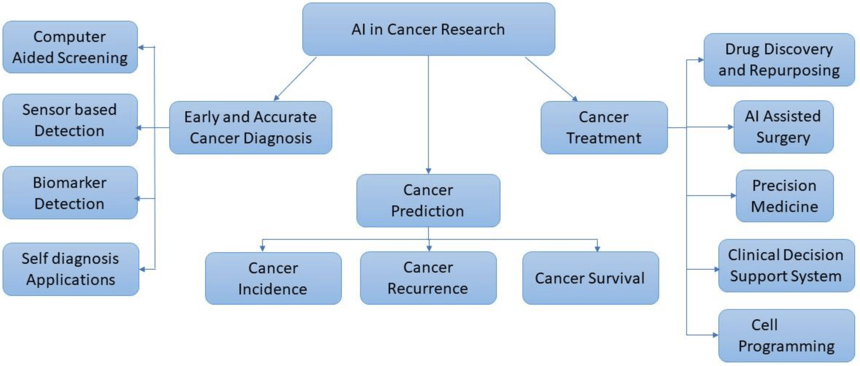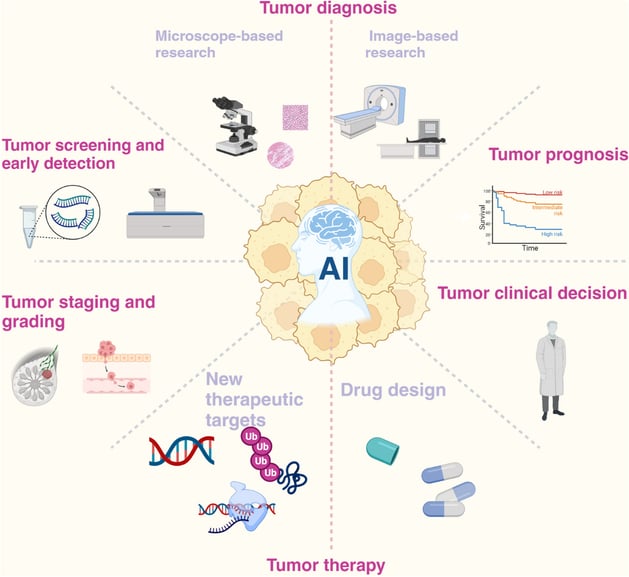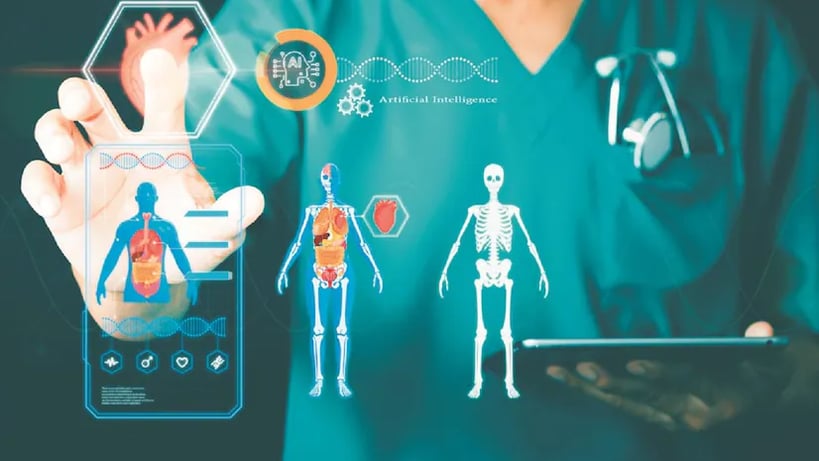AI solution for Cancer diagnosis
Artificial Intelligence (AI) is transforming the landscape of cancer diagnosis by enhancing early detection, improving diagnostic accuracy, and personalizing treatment plans. By analyzing vast amounts of medical data—from imaging scans to genetic information—AI is empowering oncologists to identify cancer at its earliest stages, detect abnormalities with greater precision, and develop tailored treatment strategies to improve patient outcomes.


How AI is Advancing Cancer Diagnosis:
Early Detection and Screening:
AI-powered imaging analysis can significantly improve early detection of cancers such as breast, lung, prostate, and skin cancer. Through the use of machine learning algorithms, AI systems can analyze medical images like mammograms, CT scans, and MRIs to identify cancerous cells or tumors that might be missed by the human eye. These systems can detect even subtle signs of cancer, allowing for earlier intervention, which is crucial for improving survival rates.
Pathology and Histology:
AI-driven pathology tools are revolutionizing the way tissue samples are analyzed. By using advanced image recognition and deep learning techniques, AI systems can examine tissue slides and detect abnormal patterns in cell structure that indicate the presence of cancer. This helps pathologists make faster, more accurate diagnoses, especially in complex or rare cancer types.
Genomic Data Analysis:
AI is increasingly being used to analyze genomic data to uncover genetic mutations or biomarkers that indicate cancer risk. AI algorithms can analyze large genomic datasets to identify mutations that might contribute to cancer development, leading to more accurate diagnoses and personalized treatment options. This helps in identifying cancer types, monitoring progression, and predicting responses to specific therapies.
Radiology and Imaging Advancements:
AI tools are becoming essential in radiology for diagnosing cancer. AI algorithms trained on thousands of medical images can identify patterns in CT scans, MRIs, and PET scans that suggest the presence of tumors. AI-assisted image segmentation helps radiologists pinpoint the exact location, size, and spread of tumors, improving the accuracy and speed of diagnosis.
Predictive Analytics for Cancer Prognosis:
AI can analyze a patient’s medical history, imaging data, and genetic information to predict the likelihood of cancer recurrence or progression. Predictive models powered by AI can help doctors anticipate how aggressive a cancer may be and suggest the most effective treatment options, improving patient outcomes.
Personalized Treatment Plans:
AI-driven solutions can tailor treatment plans based on an individual’s specific cancer type, genetic makeup, and response to past treatments. By leveraging vast databases of clinical research and patient outcomes, AI can suggest personalized therapies, from chemotherapy and immunotherapy to newer targeted treatments, optimizing the effectiveness of care.
AI in Liquid Biopsy:
Liquid biopsy is an emerging technology where AI is used to analyze blood samples to detect cancer-related genetic mutations or abnormal cells. This non-invasive method allows for early detection of cancer and continuous monitoring of treatment efficacy, providing a faster, less invasive alternative to traditional biopsy procedures.


Benefits of AI in Cancer Diagnosis:
Faster and More Accurate Diagnoses: AI can quickly analyze medical data, reducing the time it takes to detect cancer and improving diagnostic accuracy, which is crucial for initiating early-stage treatment.
Improved Early Detection: AI tools can identify minute changes in imaging scans or tissue samples that human eyes might miss, allowing for earlier diagnosis and better survival rates.
Personalized Medicine: AI can tailor cancer treatments to the individual, improving treatment efficacy by considering genetic factors, tumor characteristics, and previous treatment responses.
Reduced Human Error: By automating routine diagnostic tasks and supporting healthcare professionals with AI-driven insights, the likelihood of misdiagnosis or oversight is minimized.
Access to Expertise: AI solutions provide access to cutting-edge diagnostic capabilities, making high-level cancer detection and treatment planning more accessible in remote or underserved areas.


Leading AI Solutions for Cancer Diagnosis:
Google Health (DeepMind): Google’s AI-powered algorithms, including those developed by DeepMind, have shown success in diagnosing breast cancer from mammograms and detecting lung cancer from CT scans, with accuracy comparable to or surpassing human experts.
PathAI: PathAI specializes in applying machine learning to pathology, helping pathologists accurately diagnose cancer in tissue samples, improving the speed and accuracy of diagnosis.
Zebra Medical Vision: Zebra’s AI-powered radiology solutions analyze CT scans and other imaging data to detect a range of conditions, including cancers such as lung, breast, and liver cancer.
IBM Watson for Oncology: IBM’s Watson for Oncology uses AI to analyze medical literature, clinical trial data, and patient information to recommend personalized treatment options for cancer patients. The platform assists oncologists in decision-making by providing evidence-based insights.
Tempus: Tempus offers AI-driven solutions for genomic sequencing and clinical data analysis. The company’s platform uses AI to uncover genetic mutations, identify treatment options, and predict cancer progression, enabling personalized care for cancer patients.
Freenome: Freenome uses AI and liquid biopsy technology to detect early-stage cancer through blood tests, enabling non-invasive screening for cancers such as colorectal cancer and breast cancer.


